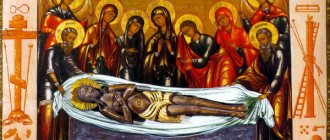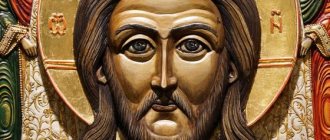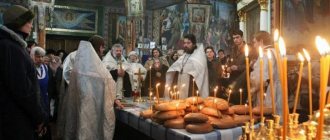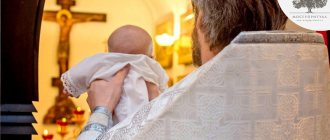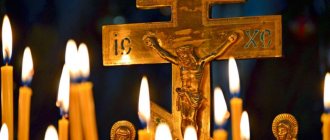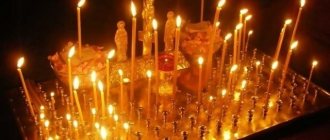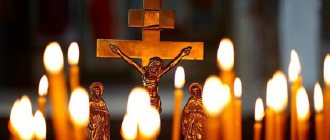On the birthday of the deceased, relatives and friends always remember their loved one. Orthodox tradition also recognizes the significance of this date and calls on believers to offer prayers to God. After death, the deceased can no longer repent and atone for his sins; on the 40th day he goes to hell or heaven, in accordance with how he lived his life.
But this is not the final verdict. The Lord gives every soul a chance for eternal life in joy and unity with himself. And her loved ones who remain on earth can help her with this.
By praying for the deceased , for the forgiveness of his sins, we give him the opportunity to cleanse himself and appear at the moment of the Last Judgment in a new state, worthy to enter the Kingdom of God .
Important dates for commemorating the deceased
According to the canons of Orthodoxy, after death, a wake is held for the deceased. Moreover, some dates are the most important. This is due to the processes that occur with the soul during the transition from earthly life to eternal life. Relatives provide support to the deceased loved one: they read prayers and also perform simple rituals. Celebrate special dates determined by the Orthodox Church:
- day of the funeral (third day after death): the soul of the deceased is just beginning to realize itself in a new capacity, closer to the day of burial the awareness of what happened is already coming, at this time the disembodied shell is accompanied by angels, while the soul was on earth, visiting familiar places, after the funeral it appears before the throne of the Lord;
- ninth day of death: the soul reappears before the Heavenly Father, and the 9th day is important, because the incorporeal shell is sent to hell to undergo severe ordeals for 30 days;
- the fortieth day after death: it is necessary to remember the Christian, because on the 40th day he appears before God for the third time, but now for the purpose of holding a private trial over him - they determine whether the sins outweigh the good deeds, as a result, the incorruptible shell falls into hell or heaven;
- anniversary of death: for the deceased, dates after 40 days no longer exist, there is no sense of time, souls no longer return to earth, therefore it would be correct to conduct a wake in such a way as to calm one’s own soul, moderate the pain, and at the same time remember the deceased;
- birthday of the deceased: for the incorporeal shell of the deceased, the birthday of the body is not as significant as for his relatives, the rebirth to a new life is more important, for this reason, remembering the deceased on such a day is a way to honor the memory of the deceased, but for the soul itself it is not so important (from the point of view of transformation).
To determine the day of the funeral, you need to take a calendar and mark the date when your loved one died. Then they count down the required number of days, starting from when the death of the relative occurred. In comparison, many people skip it, which leads to mistakes when holding funerals.
Funeral meal with family
Dates of birth according to Orthodox canons
Coincidences in which the day of remembrance (the date of death of the deceased) falls on the date of his birth are rare. But few people know what to do: should they go to the cemetery, visit the grave, or should they gather at home to celebrate such a day. It is necessary to take into account that a person has 3 dates of birth, and each of them symbolizes something different:
- date of birth: at birth, the main thing is the body, thanks to it habits are formed, the thought process occurs, various events happen, this day is considered the person’s birthday;
- baptism: during the sacrament, the rebirth of the Holy Spirit into spiritual life occurs, while a kind of death of a person occurs, but only for an unrighteous life (carnal, sinful), after which it becomes possible to take part in various sacraments of Christianity;
- date of death: in the end, a person is born for the third time during his life, but at the same time the rebirth concerns his soul, it passes into a new form of existence (leaves the body, finds itself in eternity).
This is one of the ways to preserve the trinity, which, first of all, manifests itself in the form of the Holy Trinity (God the Father, God the Son, the Holy Spirit).
Candle for the repose - Holy Saturday
Should I come to the cemetery on the name day of the deceased?
It is possible and necessary to visit the resting place of a loved one on the anniversary of his birth, if there is a physical opportunity and a spiritual need.
However, if the mourner feels discomfort from the event, going to the cemetery during this period causes internal contradictions - it is advisable to listen to yourself. You can postpone visiting the deceased, postpone it to another date, and at this memorable time limit yourself to going to church or other commemoration. The most important thing is to remember your dear people, think about them with a light heart, a pure soul, without negative thoughts and emotions. And where and how - everyone has the right to decide for themselves.
source
Holy Saturdays for the general remembrance of the dead
Parental Saturdays began to be called that way due to the primary task of remembering parents. But then you can also honor the memory of other loved ones. It is recommended to visit the temple, attend the litia, and the transfer of notes about the repose of the souls of those who happened to be buried (in the near future or quite a long time ago) is also encouraged. It is noted that there are universal and private Parental Saturdays; in the first case, such a date is found in all faiths - it implies the need to commemorate Christians. On private days, only Orthodox believers can be remembered.
There are 7 Parent Saturdays:
- Meat Empty: is universal, this Saturday is the first among other memorial days, the recommended time is 1 week before Lent, Saturday received its name due to its connection with Great Lent (Meat Empty);
- 2nd week of Great Lent: on this day, as on the other 2, you can celebrate the liturgy for the dead;
- 3rd week: preparation for Easter, the date falls in March-April, because it is floating and is tied to Lent and the Resurrection of Christ;
- 4th week of Lent;
- Radonitsa: commemoration is carried out for the first time after Lent, only conditionally refers to the week (held on Tuesday of St. Thomas week), such a day has more weight among Christians than others, since it becomes possible to hold a liturgy
- Trinity Saturday: Saturday falls during the period when the Holy Trinity is celebrated, is considered the second day on which the service is held, and is also ecumenical; it is distinguished by the fact of the condescension of the Holy Spirit on the apostles, which served as the beginning for the birth of the Apostolic Church;
- Dmitrievskaya: the day is dedicated to the memory of Dmitry Solunsky, people usually pray for the dead, but the first priority is to commemorate the deceased military personnel.
Flowers for funerals
What to do on the birthday of the deceased
On the birthday of the deceased, relatives should behave as if they were organizing a holiday for the living. This implies that it is necessary to create a similar atmosphere: calm, positive emotions. This is sometimes difficult to accomplish, especially if the wake falls on a birthday shortly after the funeral. However, following certain rules will allow you to show respect for the soul of the deceased.
Order a memorial service and light a candle in the church
When visiting a church, you should check with the priest on which Saturday the memorial service is held. If possible, you need to stand the service. After this, there will be many opportunities for commemoration: you can light a candle in church or perform all the actions at home (a candle is also placed, but in front of the images, a prayer is said). In order for the deceased to be mentioned during the service, it is necessary to submit a note with the name (through the church shop).
Memorial service for the repose
Visit and clean the grave
On memorial days, as well as any other (except for religious holidays), you can go to the cemetery. Light cleaning is carried out there, since a more thorough invasion of the cemetery can be fraught with consequences (if the spirit of the deceased feels that his things are being taken away or thrown away). Most often, such a danger arises when visiting a grave before the 40th day, when the incorporeal shell is still between the worlds. Later, you can clean up as the situation requires (throw away the old wreath, dried flowers, etc.). The reason for more free behavior in the cemetery is the completion of the cycle of transformation of the incorporeal shell.
The manifestation of strong emotions can attract the soul of the deceased; it will experience suffering along with living relatives, so everyone who comes to the cemetery should try to avoid emotional distress and remain calm.
You can go to the cemetery regardless of the occasion: commemorating a recently deceased relative or honoring the memory of a long-dead loved one. In both cases, it is recommended to put flowers in a vase / place flowers on the grave / plant live plants. The answer to the question whether it is possible to go to the cemetery on the birthday of the deceased will be positive, as at any other time: on the 9th, 40th day, the first and subsequent anniversaries.
Funeral flowers
Some bring with them small but valuable things that were dear to the deceased. They often take food with them, but not for the purpose of celebrating a funeral, but to appease the soul of the deceased. This is an outdated pagan custom, and therefore it is better not to bring items or food. The exception is Kutya.
Ancestors and esotericists about visiting a cemetery
On the birthday of a deceased person, it was previously customary to gather at the grave, and initially there was no tradition of eating food here. It was formed later - during the times of the Soviet Union, when churches were closed, people gathered at the cemetery at the graves of relatives to celebrate religious holidays, and they also commemorated their loved ones there.
Esotericists do not recommend being in the area where there is dead land in the afternoon. If you are planning a visit there, it is better to distribute your time so that you arrive at the grave no later than 14:00. This is due to the fact that in the first half of the day a person’s energy is stronger, and therefore energy exchange is slower. Accordingly, you can receive less negative energy. Otherwise, the risk of causing considerable harm to the soul increases.
Symptoms that indicate a negative impact: irritability, headache, heaviness in the soul, manifestations of aggression.
Visit to the cemetery
What not to bring to the grave
If relatives are planning to go to the cemetery on the deceased’s birthday, you need to take into account what you should not take with you to the grave:
- alcohol;
- cigarettes;
- salt;
- salty food;
- products;
- personal belongings (books, etc.).
Drinking alcoholic beverages and smoking near the grave are prohibited. This contributes to the formation of incorrect aspirations. Considering that the soul retains the memory of actions and events for some time, such behavior may cause a desire to return to earthly life. A person who smokes in a cemetery puts himself at risk, because this weakens his energy, and the risk of the negative impact of the dead energy of this place increases.
Salt is not brought to the cemetery, because it is a powerful magical tool. It is used by sorcerers to cause damage. Salty food increases appetite, because it improves taste, this contributes to increased manifestations of gluttony. It is not recommended to bring food to the cemetery; this is not a place for a funeral meal, even if there is an occasion - the birthday of the deceased person.
It should be celebrated at home or in a cafe. Personal belongings cannot be taken to the grave, because nothing should be taken from the cemetery, even if something has been dropped or forgotten. Such items have already absorbed negative energy and can have a bad influence on the owner.
Read prayers for the soul of the deceased
The prayer word is very powerful. For this reason, relatives remember the deceased by reading sacred texts. This method is considered sufficient when it comes to helping the deceased when he goes through ordeals. It does not matter on what day the prayers are read: on the birthday of the deceased, one of the memorial Saturdays, immediately after the funeral. The effect is always equally strong. That is why it is not recommended to drink alcohol or engage in gluttony in a cemetery - these are unnecessary attributes of a wake that do not benefit either the living or the dead.
Reading a prayer service
Actions that help the soul ascend to heaven
Many people do not live a righteous life and do not have time to repent before death. But the soul no longer has this opportunity, as a result, when a person dies, the incorruptible shell can hardly endure ordeals and can end up in hell. Her loved ones are able to help her get through difficult trials, but on the condition that they read prayers. In addition, it is recommended to independently strive for God and change your life by doing righteous deeds. Then there is a chance that the soul of your loved one will go to heaven. Recommended:
- to be honest, not to be a hypocrite;
- provide support to those who are grieving and those in trouble;
- show mercy without paying attention to a person’s social status;
- give alms to the poor;
- forgive offenders: among relatives or enemies;
- confess, take communion;
- do not slander;
- show tolerance for the shortcomings and actions of others (unless they contradict the laws of God).
Organize a small memorial dinner
It is allowed for family or a narrow circle of friends to gather to celebrate the birthday of the deceased. It would be right to do this at home or in a dining room/cafe. Moreover, the meal should not be plentiful, and the dishes should not be luxurious.
Products on the funeral table in the church
Modesty should be shown, because lack of a sense of proportion can also harm the soul of the deceased. It is better if this day is celebrated with simple food. A large number of people are invited immediately after the funeral or on the 9th, 40th day. In the future, there is no need to gather all your friends. Most often, the family of the deceased celebrates his birthday with a small number of people.
Distribute sweets to children and relatives
Regardless of who dies (grandmother, child, etc.), it is customary to distribute sweets and pies. They are given so that other people remember the deceased who has a birthday. This is done in other periods: when the time of Parent's Saturday comes, and also the 3rd, 40th day, anniversary (first, third, etc.) comes. You can distribute sweets to relatives who live separately, friends, colleagues and random passers-by on the street.
How not to celebrate the birthday of the deceased
If the relatives have already found the answer to the question of whether the deceased’s birthday is celebrated in Russia (this can be done if desired), the next step is to decide how to organize this event. Prohibitions on the birthday of the deceased:
- have fun;
- bring alcohol, cigarettes or food to the grave (only kutya is allowed);
- leave gifts for the deceased: the soul does not need things, all that is needed is prayers;
- strongly express grief: many people associate visiting a cemetery with grief, so people do not allow themselves to feel peace next to the grave of a loved one; one should not grieve when the birthday of the deceased comes.
Flowers for the grave
Church prayer for the deceased on his birthday
The birthday of the deceased is another reason to show love for him and prayerfully honor his memory.
“The duty of love to our neighbors obliges us to pray for the departed who have passed into eternity. <…> By praying for the departed, we thereby testify to our love for them, express compassion and mercy” (Archimandrite Kirill (Pavlov).
Therefore, to the question: “how is the birthday of a deceased person celebrated?” There is a clear answer - you need to pray. They pray both in private prayer at home and in congregation in church.
The apogee of all church life is the Divine Liturgy. On it, bread and wine are transformed into the Body and Blood of Christ, sacrificed to atone for sins. Therefore, as St. Cyril of Jerusalem writes:
“Great will be the benefit of the souls for whom prayer is offered at the time when the Holy and Terrible Sacrifice is offered.”
The tradition of commemorating deceased relatives dates back to apostolic times, as St. John Chrysostom reminds us:
“It was not in vain that the apostles legitimized the creation of memory of those who died during the performance of the Terrible Sacraments. They knew that there would be great benefit for the dead, that they would receive much benefit from this. When all the people stand with outstretched hands, and a host of priests with them; when the Terrible Sacrifice is presented, how can we not appease God by praying for those people?”
In addition to commemoration at the proskomedia, you can order a memorial service. This is a special service in which they pray for the forgiveness of the sins of the deceased and granting them peace in the Kingdom of Heaven.
Priest Philip Ilyashenko speaks figuratively about the importance and necessity of church commemoration of the departed:
“You can compare this (commemoration in Church) with how you need to wash your hands when you come home, but this is not enough, sooner or later you need to go to the shower or to the bathhouse. Thus, the crown and meaning of everything that happens in the Church is the sacrament of the Divine Eucharist, the liturgy, when we remember the living and the dead, when we partake of the Body and Blood of Christ.”
Is there any point in celebrating the birthday of someone who is not there?
Traditions differ at different times. If previously it was not customary to visit the cemetery when the birthday of the deceased came, today many consider it obligatory to go to the grave several times throughout the year, and not only on memorial days. Usually they bring fresh flowers and tell the deceased about the news that has happened recently. Then they gather at home for a funeral meal.
Opinion of esotericists
Expert opinion
Lantsova Kristina
Esotericist
A connection can be established between the souls of the dead and the living; it is especially strong on memorial days, when relatives come to the grave. For this reason, the ancestors tried not to disturb the dead again. Even if you dream of a dead person, it is better to go to church and order a memorial service to hold it for the repose of the soul of the deceased. It is believed that if you visit a grave, you can attract the soul of the deceased.
Church view
Father Vladimir
Clergyman
A person has 3 birthdays: when the physical body is born, baptism and the date of death. The Church considers the last day to be especially important. The memory of the physical body should not be honored, since it is not original, although it is also valuable. However, after death, it is much more important to celebrate the day when the person died, because that is when the rebirth of the soul occurs. The church does not prohibit visiting the cemetery when the birthday of the deceased occurs. Relatives can visit the grave if there are no restrictions (for example, this should not be done if the date falls on a religious holiday).[/expert_bq]
Funeral dinner
Is it possible to visit the grave of the deceased on his birthday?
Everyone must decide for themselves whether to visit the grave of a deceased person on his birthday or not. There is no correct answer – and there are no special prohibitions. If you need to go to the churchyard, you can visit the deceased. Please note: it is prohibited to bring sweets and drinks (including alcoholic drinks). If you want to please the soul of the deceased, on his grave you can leave a lighted candle or lamp, flowers - both artificial and real, an object that the deceased valued during his lifetime, a beautiful card with warm words. On this day it is prohibited to use foul language, smoke, swear or quarrel – both in the cemetery and outside it.
The desire to come to the cemetery to see a deceased relative or friend must be sincere and come from the heart. If there is no such desire, it is better to postpone the visit to the churchyard to another memorial day - for example, on Trinity Ecumenical Saturday, parental days or the anniversary of the death of a person.
Question-answer section
How to remember if the day of death and birth coincided? What prayers should I read?
Expert opinion
Father Pavel
Clergyman
Considering that the church, after the death of a person, recognizes only one birthday - the date of death, one should not focus on such coincidences. Even if a relative died on his birthday, traditionally the funeral is held on the 3rd day, the wake - according to the date (9, 40 days, 1 year, etc.). You can visit the cemetery and bring kutya. You should come to the temple, order a memorial service, Sorokoust, but it is also permissible to read prayers at home - the Psalter (different verses in succession).
What happens if you don't celebrate the birthday of the deceased?
Expert opinion
Father Pavel
Clergyman
Commemoration on the birthday of the deceased is not obligatory. This date was not previously noted. It was not customary to go to the grave and disturb the deceased in other ways. Today, traditions have changed, but something has remained unchanged - there is no need to mark the date of birth of the deceased, be it a husband, mother, father, son or daughter. It is enough to visit the temple, light a candle for the repose, and pray.
Is it possible to put a glass of vodka and bread on a grave? Everyone does it
Expert opinion
Lavrova Tatyana
Rehabilitation specialist, psychologist
The tradition of leaving food for the deceased is pagan. According to the canons of Orthodoxy, the soul does not need earthly things, food. Moreover, you cannot leave alcohol, because it harms not only the dead, but also the living. As a last resort, you can leave water and bread or kutya - this is symbolic alms, meaning that relatives pay tribute to the deceased. You shouldn't put vodka just because everyone else does it. It is the erroneous repetition of initially wrong actions that are sinful.
Stack of bread
Is it possible to go to a Christian cemetery on the birthday of a deceased person?
Expert opinion
Father Pavel
Clergyman
The Church does not prohibit visiting the cemetery when the birthday of the deceased comes, but it does not contribute to strengthening this tradition. You cannot visit the deceased only if the day the person was born falls on a great religious holiday.
Do Muslims remember the deceased on his birthday?
Expert opinion
Father Pavel
Clergyman
According to Muslim traditions, it is not customary to celebrate the date when a person is born. Moreover, they do not celebrate it after the death of a person.
What to do on the birthday of a deceased person at home?
Expert opinion
Lavrova Tatyana
Rehabilitation specialist, psychologist
You can hold a small memorial meal, gathering close people at the table. If you have no idea what to do on the birthday of the deceased, you can read a prayer or come to church and light a candle for the repose.
Candles for the repose
Why can’t you go to the cemetery on the birthday of the deceased, if 40 days have not passed since the death?
Expert opinion
Father Pavel
Clergyman
The church does not ban visiting the cemetery before the 40th day. But there are some recommendations: the soul is still between worlds. In order not to disturb her or interfere with her ordeal, it is better to refrain from unnecessary visits. It is extremely important to come to the cemetery 9 or 40 days after death, and not in the evening, but in the morning or afternoon.
How do relatives celebrate the birthday of the deceased?
Expert opinion
Lavrova Tatyana
Rehabilitation specialist, psychologist
It is acceptable to read prayers and remember a loved one in prose among each other at the funeral table or at the grave. You should keep your emotions under control so as not to disturb the soul, not to pull it back to the ground with your grief. It is better to choose abstract topics - about news that happened over the last period.
The mystery of death
Death is the most mysterious phenomenon for humans. All people know about its inevitability and at the same time try to isolate themselves from thoughts about it. But sooner or later everyone inevitably comes face to face with death. We all lose family and friends. If a person believes in the immortality of the soul, he begins to wonder what can now be done for the deceased. In particular, questions arise about the birthday of the deceased. How is the birthday of a deceased person celebrated? How to remember the deceased on his birthday? Let's answer these questions.
Orthodox cemetery
“Oh, death! how bitter is the memory of you for a person who lives calmly in his possessions, for a person who is not bothered by anything and is happy in everything and is still able to eat food” (Sir. 41:1).
Prayers for the repose of the soul of the deceased in Orthodoxy
There are special prayers for different occasions. This allows you to better formulate your own thoughts, direct them in the right direction, share your pain, make it clear what you need and how to help your loved one. But you can address the Lord and the Saints in your own words.
Prayer up to 40 days
They turn to the Heavenly Father, the Son of God Jesus Christ. There are different prayers, they are chosen taking into account what relative they are asking for: if the parents, child, etc. have died.
Prayer after 40 days
Turn to the Lord. You should read the Psalter at home, and order Sorokoust in church.
Prayer for a year after death
They read the Troparion, tone 8, asking for the repose of a loved one. They glorify the Lord in prayer.
Prayer for husband
Turn to Jesus Christ. The prayer text is quite long; it should be written on a piece of paper, as it will be difficult to learn right away. Moreover, it is recommended to read it in front of the icon of the Most Holy Mother of God, who survived the death of her son and his resurrection, which means it will give strength to accept the sad situation and survive it.
Widow's prayer for her husband in church
Prayer for a wife
When reading the prayer text, turn to Jesus Christ. You can say it in front of one of the icons that depicts the Savior.
Prayers for the repose of parents: mother, father
You can turn to the Lord Jesus Christ, and there are prayer texts for each of the parents: father, mother. You can recite the text in front of any icon of the Savior.
Prayer for children
There are special prayers to help your daughter and son. When reading, they turn to Jesus Christ, but you can read the prayer text in front of the icon of the Savior and the Mother of God.
The meaning of prayers for the dead
Sincere prayer, fervent petition has the ability to change the fate of a deceased father or mother when God's mercy descends on him. At death, only the physical shell of a person dies, but the soul continues to live, it is in another dimension.
In Orthodoxy, the deceased father and mother are honored on parental Saturdays
While making their way in life, relatives could pray for the salvation of their souls themselves. Near the Creator, the newly departed soul awaits its fate, which can be mitigated by the prayers of children for their deceased parents.
It is important:
- Prayers for the repose of every Orthodox Christian
- Sorokoust for the repose
There are many testimonies of Christians whose father or mother died, but no one prayed for them. The feeling of guilt and some kind of anxiety did not leave the children; they often dreamed of their ancestors at night, increasing anxiety. Everything stopped only after the children began to read a prayer for their deceased relatives.
Our Lord, Jesus Christ! You guard the orphans, protect the mourning and comfort those who cry. I come to you, orphan, crying and begging You: hear my prayer and do not turn your face away from the sighs of my heart and the tears of my eyes! I pray to You, merciful Lord, quench my sorrow for my parent (name), who gave birth and raised me, and accept his soul, which has gone to You with reverence for You and firm hope for Your understanding and consolation, into Your Kingdom of Heaven. I bow before Your holy will, and I trust in You, just do not take Your protection away from them. Lord, as the judge of this world, You will punish the sins and vices of the fathers in their children, grandchildren and great-grandchildren, even the third and fourth generation. But You also have mercy on fathers for the prayers and virtues of their children, grandchildren and great-grandchildren. I pray to you with contrition and prayer of heart, merciful Judge, and do not punish with eternal punishment your deceased unforgettable servant, my parent (name), forgive him all his sins, voluntary and involuntary, in word or deed, with knowledge or ignorance, committed by him in his life here , on the ground. And according to Your mercy, for the sake of the prayers of the Most Pure Mother of God and all the saints, have mercy on him and deliver him from eternal torment. You are a merciful father of fathers and children! Grant me all the days of my life until my last breath and do not cease to remember my deceased parent in your prayers. And I ask You, the righteous Judge, give him a bright, cool and calm place, next to all the saints, and save him from all illnesses, sorrows and suffering. Dear Lord. Accept my true prayer for Your servant today and reward him with Your mercy for his deeds and my upbringing in faith and Orthodoxy, which taught me first of all to see You, My Lord, to pray to You in reverence, to trust in You alone in difficult times, troubles and sorrows, keep Your commandments. For the fact that he honored Your prayers and followed my spiritual progress, for the warm prayers he brought to You and for all the gifts asked for me from You, give him Your mercy, Your heavenly blessings and joys in Your eternal Kingdom. For You are the God of mercies and generosity and love for mankind, You are the peace and joy of Your servants, and we send up glory to You with the Father and the Holy Spirit, now and ever and unto the ages of ages. Amen.
Traditions of commemoration in other religions
Representatives of different religions and denominations have their own traditions that they follow:
- Catholics: commemorations are held on the 3rd, 7th and 30th day after the death of a loved one, but relatives leave it at their discretion whether to invite guests to the memorial meal; commemoration is also required 1 month before winter sets in (November 2);
- Jews: after death, they hold Shiva (a week of mourning), limit the consumption of fast food, holidays, and do not even do work;
- Muslims (Armenian, Tatar and other traditions): despite the differences between languages, peoples adhere to similar rules, Muslims hold private and general funerals, the first of them take place on the 3rd, 7th and 40th day, after 1 year, men and women have meals in different premises, they prepare quite simple dishes.



